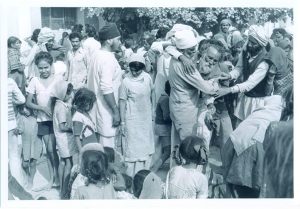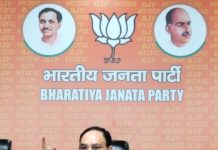 Nemesis is the punishment that is inevitably followed by hubris. When the Delhi High Court upheld the conviction of 70 of the 89 persons awarded a five-year jail term by a trial court for rioting, burning houses and violating curfew in East Delhi’s Trilokpuri area during the 1984 anti-Sikh riots, the culprits have met their nemesis.
Nemesis is the punishment that is inevitably followed by hubris. When the Delhi High Court upheld the conviction of 70 of the 89 persons awarded a five-year jail term by a trial court for rioting, burning houses and violating curfew in East Delhi’s Trilokpuri area during the 1984 anti-Sikh riots, the culprits have met their nemesis.
The conviction of rioters for their role in the 1984 anti-Sikh riots marks a rare success in the long struggles to bring the perpetrators to justice. The court noted that the anti-Sikh riots were a “dark chapter” in the history of independent India. “The police force and the civil administration did not take timely or effective action to prevent the riotous conditions from spiraling out of hand. The criminal law process began but hesitatingly and belatedly.
However, the question still arises, if the big fish are still roaming free. Immediately after the judgment was pronounced, Delhi Chief Minister, Arvind Kejriwal tweeted “I welcome Delhi High Court judgment upholding the conviction of 88 culprits responsible for the murder of hundreds of innocent people in Trilokpuri during 1984 riots. Justice has so far not been done to riot victims even after 34 years. Big fish are still roaming free”.
Welcoming the judgment upholding the conviction of around 88 people for rioting during 1984 anti-Sikh riots, Kejriwal said the “big fish” are still roaming free and justice has so far not been done to the riot victims even after 34 years. After the assassination of the then Prime Minister, Indira Gandhi on October 31, 1984, the next couple of days witnessed widespread rioting and killings of Sikhs in the national capital and elsewhere.
According to the FIR lodged in connection with the Trilokpuri incident, 95 people had died in the rioting and 100 houses were burnt. The convicts had challenged the August 27, 1996 judgment of Sessions Court which had convicted 88 out of the 107 people arrested on November 2, 1984, for rioting, burning houses and curfew violation in Trilokpuri area of East Delhi. Justice R K Gauba dismissed their 22-year old appeals against the conviction and asked all the convicts to surrender forthwith to undergo the prison term.
Of the 88 convicts who moved the high court, several have died during the pendency of their appeals and the case against them has abated, police had earlier said.
Earlier on November 20, a Delhi court had awarded death penalty to convict Yashpal Singh for killing two men in the 1984 anti-Sikh riots, the first capital punishment in the case. The court had also awarded life term to co-convict Naresh Sherawat in the case. It was the first conviction in the cases reopened by the SIT.
Last month, the Delhi Patiala House Court awarded death sentence to Yashpal Singh and handed another convict Naresh Sherawat life imprisonment for their role in 1984 anti-Sikh riots. The verdict was pronounced in Tihar Jail due to security concerns. The convicts were previously attacked on the premises of the Delhi court during the hearing of the case on November 15.
The two were convicted on November 15 for killing two Sikh youths in Delhi’s Mahipalpur area after the assassination of former Prime Minister Indira Gandhi. Of particular significance is that this case, relating to a mob attack on shop-keepers in Mahipalpur, was resurrected after being closed as ‘untraced’ in 1994. The attack with deadly weapons left two Sikhs dead and three wounded. The Central government’s decision in 2015 to form a Special Investigation Team to reopen serious cases related to the 1984 riots has yielded results. Yashpal Singh, a goods transporter, has now been sentenced to death, and Naresh Sehrawat, the local postman when the mob attack took place, to life. The trial court brushed aside minor discrepancies in evidence and technical objections to the fresh investigation being taken up.
The investigation into the 1984 riot cases has been severely hampered by the fact that large sections of the police connived with the rioters, who included Congress functionaries and supporters. In this very case, a long-time Congress functionary, Jai Pal Singh, had been tried and acquitted by a magistrate’s court as early as in 1986. However, the witnesses who identified Naresh and Yashpal among the 800-odd rioters at Mahipalpur, had once again said Jai Pal Singh was a prominent participant in the attack. This is just one instance of how influential men have managed to evade the law. An appeal challenging the acquittal of Congress leader Sajjan Kumar is in the Delhi High Court.
The Delhi Police had closed the case in 1984 for want of evidence. However, a Special Investigation Team on the riots reopened it.
Of the 650 cases registered in connection with anti-Sikh riots in Delhi, 267 were closed as untraced by the Delhi Police. Of these 267 cases, the CBI later took five up. The SIT also scrutinised the records of 18 cancelled cases.
The SIT found 60 cases appropriate for further investigation. It filed “untraced report” in 52 cases in the last one-and-a-half years.
Out of the eight cases being investigated, charge sheets have been filed in five, and three, in which senior Congress leader Sajjan Kumar is an accused, are pending investigation.
In its 79-page verdict, the court said the police did not promptly register the crimes and collect evidence and the other agencies, including the prosecution and the trial court, “failed to rise to the occasion”.
Justice Gauba noted that 95 bodies were recovered after the rioting, 22 of which remained unidentified and it was likely that no prosecution was initiated against anyone in respect of these deaths. “This court directs the Commissioner of Police, Delhi, to have the material and evidence re-examined for further action… The large-scale rioting, mob violence, arson, plunder, genocide, and looting has been duly proved and established… the judgment of the trial court must be upheld.”
Dismissing the appeals of the convicts and canceling their bail bonds, the court noted that after each communal riot, there were allegations of political influences being the root cause and therefore, there could be a need to “inject” a “sense of neutrality” in the investigative and prosecution process.
As many as 16 of the remaining 19 persons died during the pendency of appeals against the trial court’s August 27, 1996, verdict. The appeals of the remaining three were dismissed after they absconded. Justice RK Gauba asked the convicts to surrender forthwith to serve their remaining prison terms.
From calling witnesses from Italy to testify in the 1984 anti-Sikh riot case to publishing public notices, the Special Investigation Team formed in 2015, took extensive measures to probe the 60 cases it had reopened out of the total 293, and succeeded in getting a conviction in the first case on Wednesday.
A Delhi court Wednesday convicted two people for killing two men during the 1984 anti-Sikh riots.
Of the 650 cases registered in connection with anti-Sikh riots in Delhi, 267 were closed as untraced by the Delhi Police. Of these 267 cases, five were later taken up by the CBI. The SIT also scrutinised the records of 18 canceled cases.
The SIT found 60 cases appropriate for further investigation. It filed “untraced report” in 52 cases in the last one-and-a-half years.
Out of the eight cases being investigated, charge sheets have been filed in five and three, in which senior Congress leader Sajjan Kumar is an accused, are pending investigation.
Additional Sessions Judge Ajay Pandey held Naresh Sherawat and Yashpal Singh guilty of killing Hardev Singh and Avtar Singh in South Delhi’s Mahipalpur during the riots. The case was lodged on a complaint filed by Santokh Singh, brother of Hardev Singh.
On November 1, 1984, Hardev Singh, Kuldeep Singh, and Sangat Singh were at their grocery shops in Mahipalpur when a mob armed with iron rods, lathis, hockey sticks, stones, kerosene oil, came towards them. The two rushed to another person’s house and locked themselves inside but they were eventually killed.
After the SIT began an investigation, it published a public notice on August 27, 2016, in leading newspapers of Punjab and Delhi requesting people acquainted with the facts of the case to give evidence. The SIT also found witnesses in different cases and even sought help from the Punjab government which formed a team assist them.
The court said it had kept “in mind the horrifying events which took place in the worst riots in Delhi when a mob of 800-1,000 people was looting and killing people, burning them alive.”
The two convicted men — Naresh Sehrawat and Yashpal Singh — allegedly followed the instructions of a then Congress leader. It was an eyewitness testimony that proved crucial in the conviction of a duo accused of killing two Sikh men during the 1984 riots in the capital.
According to the testimony, relied upon by public prosecutor S K Kain, a Congress leader and one of the accused, Naresh Sehrawat, were leading the mob, exhorting it to attack and kill Sikhs. The testimony was given by Sangat Singh, the brother of one of the victims, Hardev. He claimed that when the mob moved towards them, he and Hardev ran to take refuge in the room of one Surjeet Singh, who too was a witness in the case. While running, they looked back and saw their shops being looted and burnt.
The Congress leader and Sehrawat are said to have followed the two, smashing the window, to attack the three brothers — Hardev, Sangat, and Kuldeep — as well as Surjeet and others. They, in fact, attacked Hardev with his own kirpan (dagger) and set the room on fire. Sangat, Kuldeep, and Surjeet, besides Dara Singh and Mohan, were injured in the attack. Sangat regained consciousness on November 5 at a hospital and discovered that his brother had been killed.
It was Kuldeep’s demeanor that proved to be critical for the court took note of the “deep impact” the incident had had on his psyche. During his deposition in January this year, he had wept inconsolably and his eyes had turned red. “His testimony remains unshaken and consistent,” judge Pandey observed.
Defense counsel O P Sharma had argued that the investigation agency had not examined any independent person from the village. He pointed out that the investigation had not shown the recovery of any weapon used in the crime. The judge, however, observed that such a recovery, given the lapse of over 30 years, was virtually impossible. On the point about not examining any independent witness, the court said: “It was difficult for any person with a good conscience to witness the same.”
It pointed out that finding other eyewitnesses — except for the victims and their relatives — posed a hurdle as anyone else would have been a part of the mob. Both accused were also convicted of dacoity, attempt to murder and other serious charges for they attacked the victims with a common intention and burnt their business establishments. The murder charge attracts a maximum sentence of the death penalty. The court will be pronouncing its order on the quantum of punishment on Thursday.
The other charges besides that of murder are under IPC Sections 452 (house break for hurt, assault or wrongful restraint); 307 (attempt to murder); 324 (voluntarily causing hurt with dangerous weapons or means); 395 (dacoity); and 436 (mischief by fire) read with 149 (unlawful assembly guilty of common object).
The court noted that the anti-Sikh riots were a “dark chapter” in the history of independent India. “The police force and the civil administration did not take timely or effective action to prevent the riotous conditions from spiraling out of hand. The criminal law process began but hesitatingly and belatedly.
“The fact that these cases have continued to linger on in courts at the stage of trial or appeals is itself an indicator of the reality that the response of the law has been tardy, ineffective and highly unsatisfactory.”
The Delhi High Court has upheld a lower court’s decision to convict 88 people in a 1984 anti-Sikh riots case. The high court reserved its order in September. Today’s verdict comes 22 years after the lower court’s judgment, delivered in 1996. Justice RK Gauba has directed all the convicts to surrender within four weeks.
letters@tehelka.com












